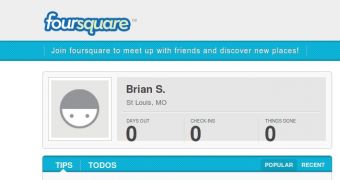Foursquare, the location-based service (LBS) everyone loves, or at least, loves to talk about, has just reached the three million users mark, indicating that its growth is still accelerating.
The service has been feeling the pressure from the Facebook Places launch, a new Facebook product which also focuses on location and offers check-in functionality, but it looks like, at least for now, it hasn't affected growth.
Foursquare is the best known of the number of LBSs which have been growing very rapidly recently and have gotten the attention of established web companies and investors alike.
Foursquare enables users to 'check in' at locations and rewards them with badges and points. The game mechanics make the service fun and make people want to check in at as many locations as they can.
The service quickly grew in popularity and has turned into somewhat of a phenomenon. Location services in general have been raising interest and are pretty much set to become a mainstream product any time now.
Perhaps the biggest push in that direction came from Facebook which has very recently launched Facebook Places, its own location service. While not a direct replacement for Foursquare or its close competitors, Facebook Places has one big advantage, the social network's huge audience.
Like Foursquare, Facebook Places enables users to check into various locations and share it with their friends. They can also check in their friends as well, by tagging them.
However, for now at least, Places doesn't have any rewards or game mechanics, leading Foursquare founder Dennis Crowley to describe it as "boring."
Boring or not, it's still a huge threat to Foursquare and many agree that the startup has to differentiate itself and fast if it wants to survive and continue to grow.
So far, two weeks after Facebook Places launched in the US, Foursquare seems to be doing great. It just passed the three million users mark, a month and a half after it reached two million users.
It took Foursquare a year to reach one million users and three months to double that. Still, it's not the largest location-based service around, as several of its competitors already have over three and in some cases over four million users.

 14 DAY TRIAL //
14 DAY TRIAL //